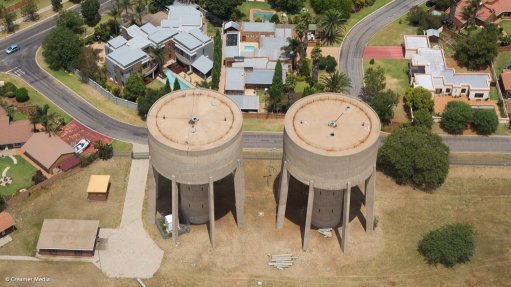
Photo by: Duane Daws
July 3, 2015.
For Creamer Media in Johannesburg, I’m Sane Dhlamini.
Making headlines:
South Africa probes socially acceptable low- and no-water sanitation alternatives.
French President Francois Hollande say African leaders must respect their constitutions or face turmoil.
And, Ebola and the economy are to blame for fewer tourists.
South Africa might face significant water stress and possible outright water scarcity in 10 to 15 years, unless its citizens adapt their behaviour with regard to efficient water use and sanitation systems.
Waterborne sanitation was an aspiration and end goal for most people in South Africa, regardless of their local context or the availability of water and infrastructure to support waterborne sanitation.
However, the development and deployment of new or alternative sanitation systems by commercial companies are also beginning to provide the context for users to change their habits proactively and supported by suitable products and services.
Water Research Commission water use and waste management executive manager Jay Bhagwan said there are many evolving technologies that can eventually form part of the sanitation delivery chain.
He said we should allow new technologies and innovations space to emerge and to form part of a new and more diverse, sanitation industry.
French President Francois Hollande urged African leaders to respect their constitutional term limits amid concerns that some are prepared to risk political instability in order to cling to power.
Hollande was speaking a day after at least six people were killed in violent clashes in Burundi, where opposition parties are furious over the decision of President Pierre Nkurunziza to seek a third term, which they say is unconstitutional.
Burkina Faso's longtime ruler Blaise Compaore was toppled in a popular uprising last October after making a similar attempt to remain in power.
"We witnessed it again in Burkina Faso. Today in Burundi we are seeing the consequences. When these (constitutional) rules are not respected, are not shared, then there are risks and there are consequences," Hollande told reporters in Benin at the start of a two-day African visit.
Benin's President Thomas Boni Yayi has said he will not seek a third term next year.
The ebola virus, economic decline in some countries, and South Africa’s new immigration regulations are to blame for the drop in tourist arrivals to South Africa, Grant Thornton Advisory Services said.
About 150 000 fewer tourists visited South Africa in the first quarter of the year compared to the same period last year, director Lee-Anne Bac said in a statement.
The 6% decline was about 1 600 tourists, or four jumbo jets, per day.
Arrivals from Russia were down 47%, Brazil 34%, China 38%, and India 13%. Tourist arrivals from the UK however increased 5%.
During the first quarter of 2009, when the world was in deep recession, South Africa recorded a 2.5% drop in tourist arrivals.
“When comparing our recessional years to our current situation, it’s a big shock,” said Bac.
South Africa had rarely experienced any decline in tourism arrivals since 1994.
Also making headlines:
Government and the private sector are working constructively to tackle acid mine drainage in the Wits basin.
Madagascar lawmakers will vote on whether to sack Prime Minister Jean Ravelonarivo and the government.
The United Nations says Somalia has made "remarkable" progress in the last two years and has reached a "tipping point" where it can secure peace.
And, the International Monetary Fund says strong economic growth in Mozambique is supported by major investments in the coal mining and natural gas sectors, but stricter control over state-run firms is necessary.
Don’t forget to follow us on Twitter [@PolityZA]
That’s a roundup of news making headlines today.